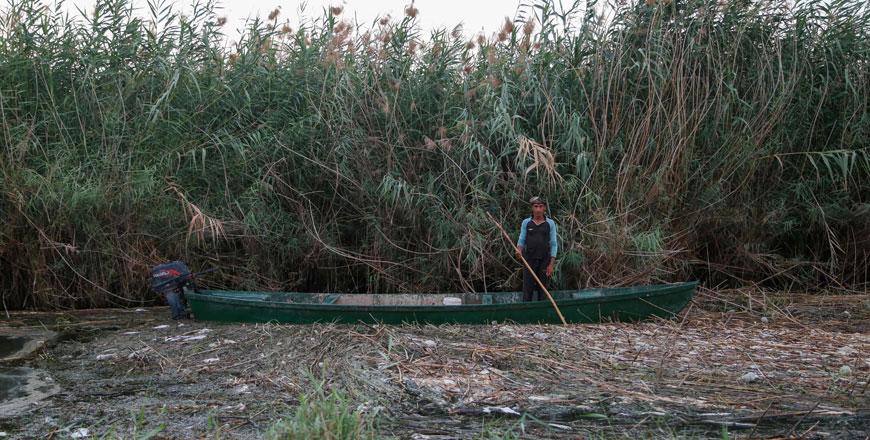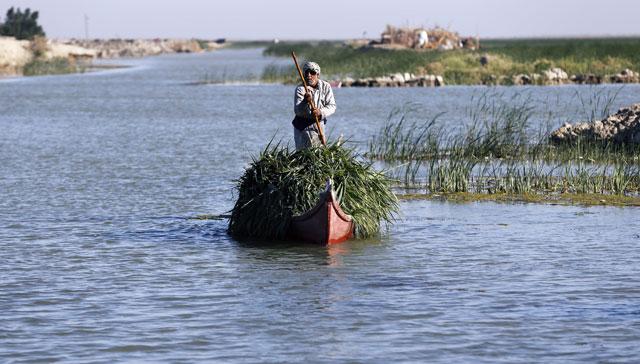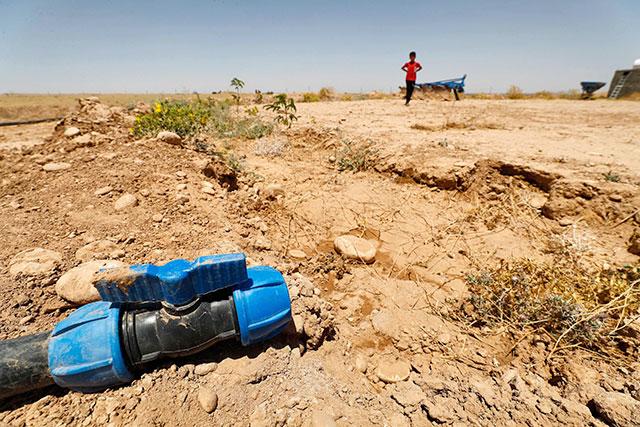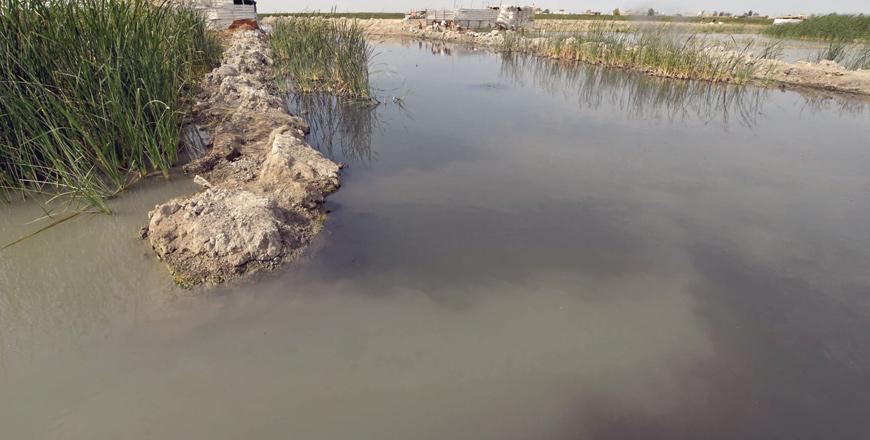You are here
Gangs, smugglers, poison? Iraq’s dead fish kick up stink
By AFP - Sep 02,2020 - Last updated at Sep 02,2020

An Iraqi fisherman makes his way through dead fish and plants in the Delmaj marsh, east of the city of Diwaniyah, in Iraq's southern province on August 25 (AFP photo)
AL DELMAJ MARSHES, Iraq — Poisoned water, illegal dams and even armed clashes: these days, fishing for precious barbels in Iraq's majestic river marshes involves navigating precarious waters.
For centuries, civilisations in southern Iraq have made a living from farming and fishing the whiskered, carp-like fish native to the twin Tigris and Euphrates rivers.
Hussein Serhan is a proud descendant of one such family.
Like his father and grandfather before him, the 70-year-old has spent his life on the riverbeds of Diwaniyah province.
Season after season, he carefully scoured vast stretches of water for schools of the ray-finned barbels he calls his "children".
This year, he did not have to look far.
Thousands of tonnes floated up to the surface of the wetland — dead.
"It's an ecological disaster," Serhan told AFP.
"We lost all our revenues. We need years to recover."
The causes of the mass premature deaths remain unclear, but marsh-based fishermen have some theories.
"Gangs," said Hussein Ali, 37, who fishes on another bank of the 325-square kilometre Al Delmaj marsh, in neighbouring Wasit province.
Ali and others blame groups with alleged links to fish importers for poisoning local supplies, although they did not specify what substance may have been used.
"They have also installed dams along rivulets that feed the marshes, which means water levels drop," Ali added.
He said anyone who tries to remove the dams, installed to horde water levels and fish stocks, is threatened.
"More than 2,000 families live off fishing in Al Delmaj. We don't know how to do anything else," Ali said.
'Where is the state?'
It's not Iraq's first riverine disaster: in 2018, fish farmers alleged their stocks were poisoned after millions of carp, used in the national dish masgoof, died.
In March 2019, a United Nations probe put the cause down to the Koi Herpes Virus, saying overstocking and low-quality river water likely furthered its spread.
This year, a preliminary study by the agriculture ministry ruled out any viral or bacterial cause, so allegations of foul play are again floating to the surface.
In June, Iraq's water ministry said its employees were shot at as they tried to remove illegal dams.
Then, in early August, a local fishing tribe clashed with an armed group that had allegedly erected some dams.
Furious locals accuse both federal and provincial authorities of failing to secure the marshes.
"Where is the state in all this? Where are they as these disasters threaten to annihilate our fish?" said Ali.
Iraq's Agriculture Minister Mohammed Al Khafaji said an investigation had begun.
"We are determined to reveal the perpetrators to the public," he said.
One speculative theory swirling among Iraqis is that Turkish and Iranian companies that usually import seafood stocks into Iraq had paid people to deliberately poison the marshes or disrupt water flows.
The alleged motive? Concerns that Iraqi consumers were opting for increasingly cheap barbels, squeezing the imported seafood out of the market.
Barbels are typically sold to neighbouring Gulf countries but this year, with borders closed for months due to COVID-19, the whiskered fish flooded local markets.
Iraqis have opted for these affordable domestic catches, stacked high in wooden stalls, instead of imported fish.
"We were self-sufficient this year and imports stopped, which frustrated others. That's why they did this," said Khafaji, declining to be more specific.
'Heavy losses'
Imad Al Makrud, who farms barbels in Al Delmaj, noted that domestic demand had indeed swelled.
"We lowered our prices to sell. The kilogramme dropped from 10,000 Iraqi dinars to 2,000 [just over $1.50]," he said.
"Iran and Turkey, the main exporters of fish to Iraq, lost a lot of money," said Makrud.
The marshes are home to rich flora and fauna, migrant birds and huge water buffalo, whose milk is made into a creamy cheese eaten at Iraqi breakfasts.
Hassan Al Rusha, a buffalo herder in Wasit, said poisoned waters killed 50 of his flock and caused more than 135 miscarriages of pregnant buffalo.
"I've never seen anything like it," he told AFP.
The losses are heavy for his village, which relied on just over 3,000 water buffalo to earn a living.
And there could be long-lasting damage to the marshlands' biological diversity, warned Diwaniyah's environmental commissioner Raghad Abdessada.
"This environmental catastrophe that took place will affect the region's economy and the people who are living off this work," she told AFP.
By Haydar Indhar
Related Articles
CHIBAYISH MARSHES, Iraq — This time last year, most of Iraq's historic marshlands were dry, desiccated by upstream damming and a c
Upstream dams in Turkey and Iran have diminished the Tigris and Euphrates rivers, which are also heavily polluted with sewage, waste and agricultural runoff as they flow southeast through Iraq.
In a country where the state lacks the capacity to guarantee basic services, 70 per cent of Iraq's industrial waste is dumped directly into rivers or the sea, according to data compiled by the United Nations and academics.














